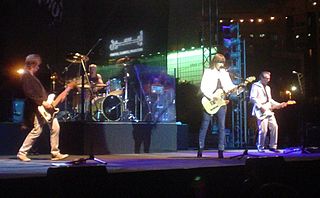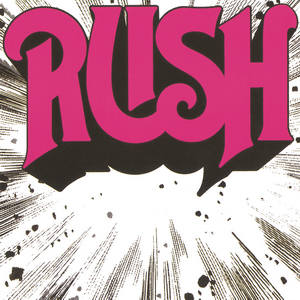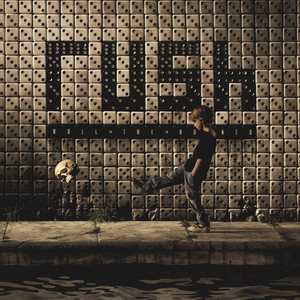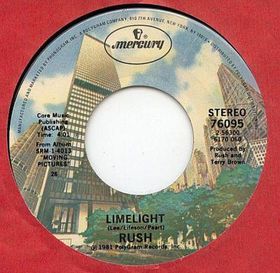Related Research Articles

Geddy Lee is a Canadian musician, best known as the lead vocalist, bassist, and keyboardist for the rock group Rush. Lee joined the band in September 1968, at the request of his childhood friend Alex Lifeson, replacing original bassist and frontman Jeff Jones. Lee's solo effort, My Favourite Headache, was released in 2000.

Rush was a Canadian rock band that primarily comprised Geddy Lee, Alex Lifeson (guitar) and Neil Peart. The band formed in Toronto in 1968 with Lifeson, drummer John Rutsey, and bass guitarist/vocalist Jeff Jones, whom Lee immediately replaced. After Lee joined, the band went through several line-ups before arriving at its classic power trio lineup with the addition of Peart in July 1974, who replaced Rutsey four months after the release of their self-titled debut album; this lineup remained intact for the remainder of the band's career.

The Pretenders are a British-American rock band formed in March 1978. The original band consisted of founder and main songwriter Chrissie Hynde, James Honeyman-Scott, Pete Farndon and Martin Chambers. Following the deaths of Honeyman-Scott in 1982 and Farndon in 1983, the band experienced numerous personnel changes; Hynde has been the band's only consistent member.

Rush is the debut studio album by Canadian rock band Rush. It was released on March 18, 1974, in Canada by Moon Records, the group's own label, before it was released internationally by Mercury Records later that year. Recorded five years after the band's formation, this first release shows much of the hard rock sound typical of many of the popular rock bands emerging earlier in the decade. Rush were fans of such bands as Led Zeppelin, Yes and Cream, and these influences can be heard in most of the songs on the album.

Roll the Bones is the fourteenth studio album by Canadian rock band Rush, released September 3, 1991, on Anthem Records. The band began working on the album after a brief creative hiatus following the tour promoting their previous release, Presto.

After the Gold Rush is the third studio album by the Canadian-American musician Neil Young, released in September 1970 on Reprise Records. It is one of four high-profile solo albums released by the members of folk rock group Crosby, Stills, Nash & Young in the wake of their chart-topping 1970 album Déjà Vu. Young's album consists mainly of country folk music along with several rock tracks, including "Southern Man". The material was inspired by the unproduced Dean Stockwell-Herb Bermann screenplay After the Gold Rush.

"The Spirit of Radio" is a song by Canadian rock band Rush, released from their 1980 album Permanent Waves. The song's name was inspired by Toronto-based radio station CFNY-FM's slogan. It was significant in the growing popularity of the band, becoming their first top 30 single in Canada and reaching number 51 on the US Billboard Hot 100. It remains one of their best-known songs and was a concert staple.

"Tom Sawyer" is a song by Canadian rock band Rush, originally released on their 1981 album Moving Pictures as its opener. The band's lead singer, bassist, and keyboardist, Geddy Lee, has referred to the track as the band's "defining piece ... from the early '80s". It is one of Rush's best-known songs and a staple of both classic rock radio and Rush's live performances, having been played on every concert tour since its release.

"Angel of the Morning" is a popular song written by Chip Taylor, originally recorded by Evie Sands but which first charted with a version by Merrilee Rush. The song has been covered by many artists including Chrissie Hynde, Dusty Springfield P. P. Arnold, Connie Eaton, Mary Mason, Guys 'n' Dolls, Melba Montgomery, Olivia Newton-John and most recognizably by Juice Newton.

The Spirit of Radio: Greatest Hits 1974–1987 is a compilation album by Canadian rock band Rush, released on February 11, 2003. It includes many of the band's most popular songs from their Mercury Records era, but does not feature any material from their third album Caress of Steel. A special edition of the album included a DVD containing music videos for several songs, including "Mystic Rhythms".
"2112" is a song by the Canadian rock band Rush. It was released as a 20-minute song on their 1976 album of the same name and is the longest single song by the band. The overture and the first section, "The Temples of Syrinx", were released as a single and have been featured in most of Rush's setlists since. Starting with the 1996-97 Test for Echo Tour, when any parts of the song were performed live, they were transposed down one full step, as heard on every live album and DVD from Different Stages forward, due to Lee's decreased vocal range. The song was adapted into a comic booklet, which used the lyrics of the song as lines for the characters and the narrations from the cover as intros.
"Between the Wheels" is a song by the Canadian rock band Rush. It was released on their 1984 album Grace Under Pressure.

"Limelight" is a song by the Canadian progressive rock band Rush. It first appeared on the 1981 album Moving Pictures. The song's lyrics were written by Neil Peart with music written by Geddy Lee and Alex Lifeson. "Limelight" expresses Peart's discomfort with Rush's success and the resulting attention from the public. The song paraphrases the opening lines of the "All the world's a stage" speech from William Shakespeare's play As You Like It. The band had previously used the phrase for its 1976 live album. The lyrics also refer to "the camera eye", the title of the song that follows on the Moving Pictures album.

"Subdivisions" is a song by Canadian progressive rock group, Rush, released as the second single from their 1982 album Signals.
"In the Mood" is a song by the Canadian rock band Rush from their 1974 debut album Rush. It was at least two years old when recorded for the album.
"A Passage to Bangkok" is a song by Canadian rock band Rush, released in March 1976 by Anthem Records. The song appears on the band's fourth studio album 2112 (1976). With the album's title track comprising the first half of the record, "A Passage to Bangkok" opens the second side of the album.
"Circumstances" is a song by Canadian rock band Rush from its 1978 album Hemispheres. Lyrically, it is an autobiographical account by drummer Neil Peart about the time he spent living in England, and his eventual disillusionment with his then-current occupations.

"Fly by Night" is a song by Canadian rock band Rush. It was released in 1975 and is the title track of their second studio album. The music was written by bassist Geddy Lee and the lyrics were penned by drummer Neil Peart. Peart wrote the song about his first trip away from home. In 1971, at 18 years old, he left behind his small-town Canadian life and flew to England. Lee sings the lead vocals and on the song's middle eight, his voice is fed through a Leslie speaker.
"Freewill" is the second track on the 1980 album Permanent Waves by Canadian progressive rock band Rush. The song's music was composed by Geddy Lee and Alex Lifeson, and its lyrics written by Neil Peart. In a 2016 review of Rush discography for Ultimate Classic Rock, Eduardo Rivadavia described "Freewill" as a "cerebral but remarkably radio-friendly" song. Lee has stated that the final verse of "Freewill" is at the highest part of his vocal range.

"Dreamline" is a song by the Canadian rock band Rush. It was released as a single and on their 1991 album Roll the Bones. The song peaked at number one on the U.S. Mainstream Rock Tracks chart, and was a staple for live performances by Rush, having been performed on every tour from the inaugural Roll the Bones Tour until the 2010 and 2011 Time Machine Tour, when it was dropped. It was performed during the subsequent Clockwork Angels Tour, where it was accompanied by the Clockwork Angels string ensemble and a video with a dedication to Neil Armstrong. It was dropped again on the 2015 R40 Tour. In live performances, the bridge was extended to incorporate a solo by Alex Lifeson.
References
- ↑ "Rush - Billboard Singles". allmusic . Retrieved September 3, 2013.